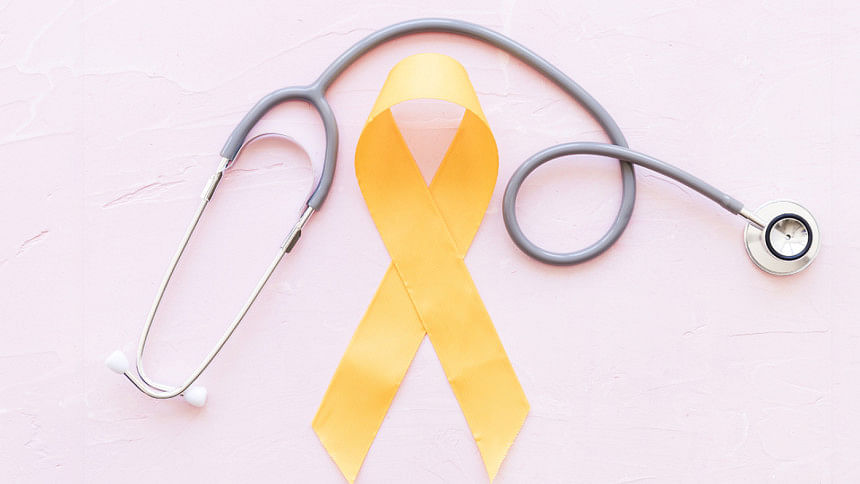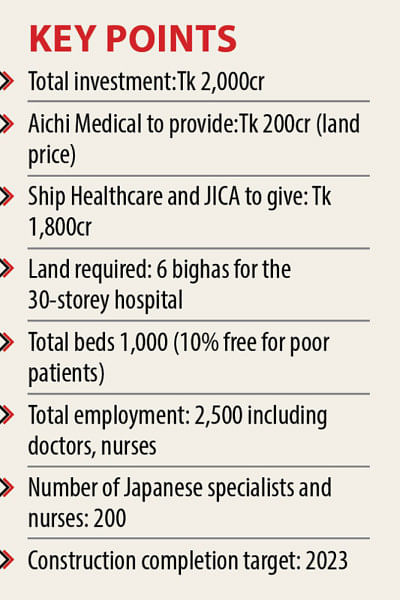Joint venture to build Tk 2,000cr cancer hospital

Japanese firm Ship Healthcare Holdings in partnership with Bangladesh's Aichi Medical Group will set up a 1,000-bed dedicated cancer hospital and research centre in Dhaka at a cost of Tk 2,000 crore.
Aichi will provide six bighas of land worth Tk 200 crore in the city's Purbachal area while the rest of the investment will come from the Osaka-based Ship Healthcare.
Japan International Cooperation Agency (Jica) is also a part of the project and will provide technical support to ensure world-class treatment at the hospital named the Japan Cancer Hospital and Research Institute.
"We have already got the design approval from the Rajdhani Unnayan Kartripakkha for construction of the physical infrastructure," said Prof Md Moazzem Hossain, chairman of Aichi Medical Group.
This would be the second hospital of the joint venture in Bangladesh.

Ship Healthcare Holdings and Aichi Medical Group earlier set up Japan East West Medical College Hospital in Ashulia for Tk 560 crore under another joint venture supported by Jica.
This was Ship Healthcare's first hospital venture outside Japan. The inauguration of the 600-bed multi-speciality hospital has been pushed back by the coronavirus pandemic and it may begin full-fledged operations in January next year.
In June, the hospital opened a coronavirus unit consisting of 200 beds.
The deals for the joint venture were signed in 2016.
"We could have started the construction work of the new hospital in July this year, but it got delayed as Japanese experts went back to their country after the Covid-19 outbreak," Hossain said.
They have started to come back to Bangladesh as the situation is returning to normalcy, he said.
"We now hope to start the construction work in January and complete the physical construction, including setting up of a lab, the effluent treatment plant for medical waste and the intensive care unit in the next 36 months. We believe we can go into operation in early 2024."
Under the joint venture, Ship Aichi Medical Services, a 30-storey hospital will be built although they have got permission for 40 floors, according to Hossain.
The hospital will create at least 2,500 jobs and will employ 200 Japanese specialised medical professionals, including oncologists and nurses.
"Ten per cent of the beds will be dedicated to the poor who will receive treatment free of cost."
The joint venture has requested the government to ease work permit for Japanese specialised doctors and nurses.
Technologies run by artificial intelligence will be introduced in the hospital for diagnostic purposes. It will put in place proton therapy for the patients, which is very sophisticated and costly.
"The therapy, which can weed out cancer cell completely, has never been used in the South Asia region," Hossain said.
The hospital will ease the hassles for around 4-5 lakh patients, who go aboard every year for cancer treatment, he said.
"We want to provide cancer treatment facilities of Japanese standards in Bangladesh."
Aichi Medical Group started its journey in 1995 and is now involved in medical, dental and nursing education along with research and development in the field.
Ship Healthcare has 300 hospitals in Japan and the group has good connections with globally renowned hospitals.
Ship Aichi Medical has signed agreements with international organisations such as Mahidol University in Thailand, Nagoya University in Japan, Osaka International Hospital for Cancer and Heart Disease Japan, and Bangpakok Medical Group Bangkok to upgrade services and carry out exchange programmes.
"Japanese companies came to provide quality treatment, not for doing business, as the cancer patients in Bangladesh do not get quality treatment due to a lack of dedicated necessary cancer hospitals," said Hossain.
Every year, around 1.5 lakh people develop cancer in Bangladesh, according to World Health Organisation.
Prof Hossain said the number of cancer patients was increasing day by day in the country.
There are 15 state-run hospitals and units that treat cancer patients in Bangladesh alongside 22 private hospitals, according to the Cancer Awareness Foundation Bangladesh, a non-governmental organisation.





Comments